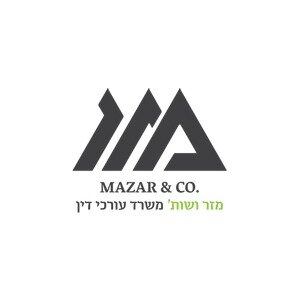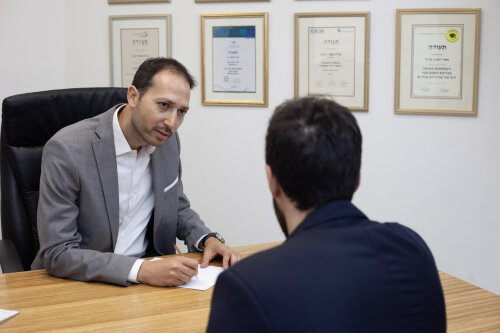Best Conveyancing Lawyers in Jerusalem
Share your needs with us, get contacted by law firms.
Free. Takes 2 min.
Free Guide to Hiring a Real Estate Lawyer
List of the best lawyers in Jerusalem, Israel
About Conveyancing Law in Jerusalem, Israel
Conveyancing in Jerusalem, Israel refers to the legal process of transferring ownership rights in real property from one person to another. Jerusalem's real estate market is unique due to its historical, religious, and cultural significance, as well as its complex legal landscape that combines Israeli law with various religious and historical land records. Conveyancing here involves careful handling of contracts, title checks, and compliance with local and national laws to ensure a secure and lawful property transaction.
Why You May Need a Lawyer
Conveyancing transactions in Jerusalem can be challenging due to intricate property rights, multiple layers of regulations, and potential historical land ownership claims. Reasons for seeking a lawyer's assistance include:
- Transferring property ownership between buyers and sellers
- Resolving boundary or title disputes
- Navigating issues related to land registry records (Tabu, Minhal, or Church lands)
- Understanding and complying with taxation obligations
- Drafting or reviewing contracts to ensure legal protection
- Managing inheritance or family-related property transfers
- Ensuring compliance with zoning and planning regulations
Local Laws Overview
The legal framework for conveyancing in Jerusalem is based on Israeli national law but includes unique local features:
- The Land Law of 1969 and the Land Registration Law establish basic legal principles for property rights and conveyancing.
- Three main land registration authorities exist: Tabu (Land Registration Office), Israel Land Authority (Minhal), and religious or institutional land owners (such as the Greek Orthodox Church).
- Foreigners may face specific restrictions or procedural requirements when purchasing property.
- Conveyancing typically involves obtaining various permits and approvals, tax clearance, and registration of rights.
- Both buyers and sellers are subject to taxes, including Acquisition Tax (Mas Rechisha) and Capital Gains Tax (Mas Shevach).
- Thorough due diligence is critical to avoid legal obstacles from prior liens, zoning violations, or unregistered renovations.
Frequently Asked Questions
What is the first step in a property purchase in Jerusalem?
The first step is usually signing a binding purchase agreement, which should be drafted or reviewed by a lawyer. Prior to this, it is vital to conduct a title search to confirm ownership and ensure there are no legal issues affecting the property.
What are the main types of property ownership in Jerusalem?
Properties can be either freehold (registered in the Tabu Land Registry), leasehold (administered by the Israel Land Authority), or subject to religious or trust-based ownership. Each type has different rights and obligations.
Do foreign nationals face restrictions buying property in Jerusalem?
Foreigners may purchase property, but certain areas or types of land may have restrictions or require additional approvals from authorities. Legal guidance is recommended to clarify these issues before signing any agreement.
What taxes and fees are involved in conveyancing?
Buyers pay Acquisition Tax, and sellers are subject to Capital Gains Tax, among other possible fees such as registration costs, legal fees, and agent commissions. The precise amount depends on the property's value and the parties' status.
How long does the conveyancing process take?
The timeframe varies based on the complexity of the transaction, type of property, and the registries involved. On average, it can take a few weeks to several months, particularly if special approvals or banking arrangements are needed.
What risks exist if I do not use a lawyer for my property transaction?
Without legal representation, you may overlook critical issues such as unregistered alterations, outstanding obligations, or contractual pitfalls. This could result in financial loss, legal disputes, or inability to finalize the registration.
What is the Tabu, and how does it affect conveyancing?
The Tabu is the official Land Registry in Israel. Properties registered in the Tabu have a reliable chain of title, and transactions involving Tabu properties must be registered there for the transfer of rights to be legally recognized.
Can I back out of a signed property contract?
Israeli law treats signed contracts as binding. Canceling a contract usually leads to penalties, unless the contract expressly allows withdrawal under specific conditions. Legal advice is crucial before signing any agreement.
What documents are needed for conveyancing?
Essential documents include the purchase agreement, identification documents, property registry extract (Nesach Tabu), building permits, tax clearance certificates, and proof of payment or mortgage documents if applicable.
How do I know if there are liens or encumbrances on a property?
A thorough search of the relevant land registry and municipal offices can reveal existing liens, mortgages, or other encumbrances. Your lawyer will ensure all searches are completed before proceeding with the transaction.
Additional Resources
- Israel Land Authority (Minhal HaKarkaot)
- The Tabu (Land Registration Office) in Jerusalem
- Jerusalem Municipality - Real Estate and Building Department
- Israel Bar Association - Lawyer Directory
- Ministry of Justice - Legal Aid Office for Property and Land
Next Steps
If you are considering buying, selling, or transferring property in Jerusalem, the following steps can help ensure a smooth and secure transaction:
- Consult with a licensed lawyer specializing in real estate and conveyancing law in Jerusalem before signing any agreements.
- Conduct thorough due diligence on the property, including title checks, legal status, and planning permissions.
- Request all necessary documents from the seller, and review them carefully with your lawyer.
- Clarify all tax liabilities and payment terms in advance.
- Ensure that all stages of the process, from drafting the contract to registering the property, are handled in accordance with Israeli law.
- If you have questions or face challenges, approach one of the recommended governmental or legal resources for guidance.
Legal advice is crucial when dealing with real estate in Jerusalem to protect your interests and avoid unexpected complications. Begin by contacting a local conveyancing lawyer to discuss your situation and get personalized support.
Lawzana helps you find the best lawyers and law firms in Jerusalem through a curated and pre-screened list of qualified legal professionals. Our platform offers rankings and detailed profiles of attorneys and law firms, allowing you to compare based on practice areas, including Conveyancing, experience, and client feedback.
Each profile includes a description of the firm's areas of practice, client reviews, team members and partners, year of establishment, spoken languages, office locations, contact information, social media presence, and any published articles or resources. Most firms on our platform speak English and are experienced in both local and international legal matters.
Get a quote from top-rated law firms in Jerusalem, Israel — quickly, securely, and without unnecessary hassle.
Disclaimer:
The information provided on this page is for general informational purposes only and does not constitute legal advice. While we strive to ensure the accuracy and relevance of the content, legal information may change over time, and interpretations of the law can vary. You should always consult with a qualified legal professional for advice specific to your situation.
We disclaim all liability for actions taken or not taken based on the content of this page. If you believe any information is incorrect or outdated, please contact us, and we will review and update it where appropriate.















